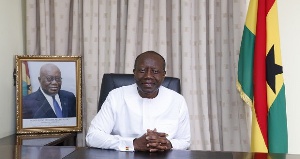The Finance Minister, Ken Ofori-Atta, has revealed that government has successfully removed about 50,000 fictitious names from its payroll and the pensions’ payroll of the Social Security and National Insurance Trust (SSNIT).
The payroll cleaning exercise forms part of efforts to block revenue leakages and make the most out of government’s revenue.
Mr. Ofori-Atta, speaking after a team from the International Monetary Fund (IMF) described some of government’s projections, particularly revenue, as being optimistic, said government is taking pragmatic steps to deal with revenue leakages.
The Finance Minister said the IMF team, which was in the country for its first Article IV consultation since May 2014, has been ‘forthright’ in its assessment and government would endeavor to work to achieve its projections as stated in the 2017 budget.
According to Mr. Ofori-Atta, the payroll cleaning exercise would ensure that government is able to properly utilize its revenue, as part of measures to achieve fiscal consolidation as well as pursuing economic growth.
Commenting on the two-week visit by the Washington-based lender, the mission chief Annalisa Fedelino, said government’s revenue projection of GH¢44.96 billion, a 33.5 percent increase in last year’s outturn, is ‘optimistic’.
The caution raised by the IMF mission chief largely stems from the fact that government has announced some tax measures that saw the reduction or the abolition of some taxes in the 2017 budget.
The tax measures announced in the budget include the abolition of the one percent special import tax, the removal of the 17.5 per cent Value Added Tax/National Health Insurance Levy (VAT/NHIL) on financial services and domestic airline tickets.
The rest include: the abolition of the five per cent VAT/NHIL on real estate and selected imported medicines not produced locally, import levies on spare parts, replacing the 17.5 percent VAT/NHIL with a three per cent flat rate for traders on the Ghana Stock Exchange (GSE), as well as giving tax credits and other incentives to businesses that employ young graduates.
Nevertheless, Ms. Fedelino said the Akufo-Addo-led government has a unique opportunity to turn the economy around given that the country had a strong electoral mandate to pursue the adjustment and reform needed to restore macroeconomic stability.
IMF programme extension
Ghana’s current US$918 million bailout programme with the IMF is endangered by the missing of several targets last year.
With the new government committed to seeing through the programme, it would have to walk the fine line of satisfying the IMF on the one hand, and making good its generous commitment to the electorate.
On whether government would seek an extension to the programme, Mr. Ofori-Atta insisted that country is committed to ending the programme as scheduled in April 2018.
The Finance Minister is confident that the government will strike the right balance, by making credible policy choices that will create the fiscal space to implement growth enhancing initiatives.
“This budget presents a clear roadmap on how we will move this economy from its current state into a full-fledged middle income economy – a Ghana beyond aid. Our goal is to build the most business-friendly and people-centred economy in Africa, which will translate into job creation and prosperity for all Ghanaians,” Mr.Ofori-Atta said.
Buoyed by renewed business confidence over possible tax cuts, the coming on stream of the Sankofa Gye Nyame gas project, the Finance Minister is hopeful the economy will grow about 6.3 percent, from the previous year’s record low rate of 3.6 percent.
Business News of Tuesday, 18 April 2017
Source: thebftonline.com

















